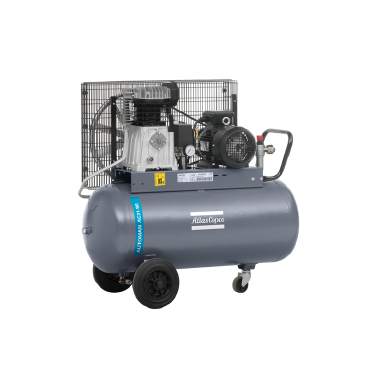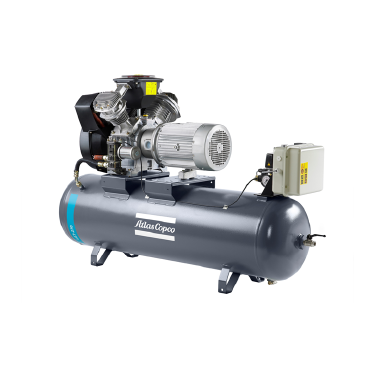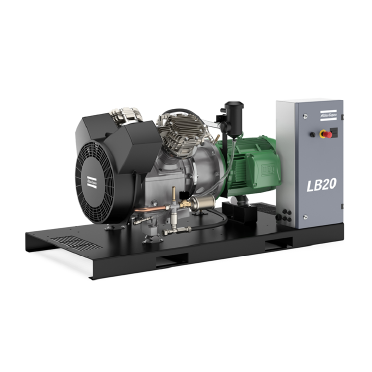We have reciprocating air Compressors for everyone's needs
Reciprocating compressors, sometimes called piston compressors, were some of the first machines invented to compressed air. Their design is constantly being refined as technology and materials improve, and they’re widely used in many industries such as: Refineries, Refrigeration, Oil & Gas, Chemical Manufacturing, Automotive, Agriculture, Medical Surgery, laboratories, PET bottle blowing and CNG. etc.
Our reciprocating air compressor range is designed to deliver a reliable source of compressed air for every user. Our portfolio of reciprocating piston air compressors ranges from 1.5 kW belt driven, handyman compressors to large industrial, cast iron, direct drive piston air compressor products.
What are reciprocating compressors?
The reciprocating or piston compressor is the oldest and most common of all industrial compressors. It is available in single-acting or double-acting, oil-lubricated or oil-free variants, with various numbers of cylinders in different configurations. With the exception of very small compressors having vertical cylinders, the V-configuration is the most common for small compressors. On double-acting, large compressors the L-configuration with a vertical low pressure cylinder and horizontal high pressure cylinder offers immense benefits and has become the most common design. Oil-lubricated compressors normally work with splash lubrication or pressure lubrication. Most compressors have self-acting valves. A self-acting valve opens and closes through the effect of pressure differences on both sides of the valve disk.
How Reciprocating Air Compressors Work
A reciprocating compressor uses the positive-displacement compressor principle, where air is drawn into one or more compression chambers, which are then closed from the inlet. Gradually the volume of each chamber decreases and the air is compressed internally. When the pressure has reached the designed build-in pressure ratio ( which is the relationship between absolute pressure on the inlet and outlet sides), a port or valve is opened and the air is discharged into the outlet system due to continued reduction of the compression chamber's volume. A bicycle pump is the simplest form of a positive displacement compression, where air is drawn into a cylinder and is compressed by a moving piston. The piston compressor has the same operating principle and uses a piston whose forward and backward movement is accomplished by a connecting rod and a rotating crankshaft. If only one side of the piston is used for compression this is called a single-acting compressor. If both the piston's top and undersides are used, the compressor is double acting.
What are oil-free reciprocating compressors?
Oil-free piston compressors have piston rings made of PTFE or carbon, and alternatively, the piston and cylinder wall can be profiled (toothed) as on labyrinth compressors. Larger machines are equipped with a crosshead and seals on the gudgeon pins, and a ventilated intermediate piece to prevent oil from being transferred from the crankcase and into the compression chamber. Smaller compressors often have a crankcase with bearings that are permanently sealed.
What are the benefits of buying a Reciprocating compressor?
- Reciprocating compressor technology is cheaper
- The technology is well known and understood by everyone in the business.
- Finding maintenance support is easy
- Piston compressor spare parts are readily available and very affordable
- The working principle is simple which means that the machinery is less complicated.
- There are a wide range of sizes that are suited for small businesses as well as larger facilities.
- Smaller reciprocating compressors are also portable which is useful for site-specific applications.
Types of reciprocating air compressors
Our reciprocating compressors are market leaders in terms of energy efficiency and innovation.
Our Atlas Copco product range includes reciprocating compressors that are suited for a variety of applications.
They come in Belt Driven, Direct Drive, Dental Air, PET Blowing and Compressed Natural Gas variants.
We suggest that you get an expert to walk you through the type of air compressors that would work best for your facility.
Give us a call and speak with one of our sales representatives directly.
Reciprocating compressor technology is cheaper
Reciprocating technology compressors are the oldest types of compressor. They are also the simplest, using very basic physics principles to function. For these reasons, revolutionary changes and improvements in this field are unlikely. But that also means the technology is well understood by all its manufacturers, at least in its most common industrial usage.
With little to no research and development cost, as well as simple and well-understood technology, the cost of production is lower. That means a wider range of manufacturers are willing to take on the product or license it under their own label. As such, the buyer benefits from a competitive market which makes for a lower cost of purchase.
Maintenance technicians are easier & cheaper to find
The age and simplicity of the technology, as well as the research plateau, impacts maintenance in the same way it affects production. For its most common industrial usage, there is no continuous learning process to stay on top of changes in piston compressors. Once a technician understands the basic principles, their skills can only improve. This means piston compressor maintenance is easier to master because the technology is accessible to any technician.
What does this mean for you, as a buyer? First of all, you have access to a larger pool of technicians experienced in this technology. Most of the time, the competitive nature of this pool of resources also means a lower cost of maintenance.
Exceptions apply in the case of specialised applications, such as the compression of natural gas, nitrogen or oxygen. However, the cost comes from the demands of the industry application, rather than the technology itself.
Reciprocating compressor spare parts are readily available
The availability of spare parts goes hand in hand with the maintenance of your reciprocating compressor. Simple technology results in a high availability of spare parts and maintenance kits. This is especially relevant in light of the many compressors produced under private labels by the same manufacturer.
For the everyday hobbyist compressor spares, the buying alternatives are as varied as there are ways to buy the compressor itself. You can speak with authorised dealers, you can visit your nearest DIY shop, or go for e-commerce sites. Whichever you choose, chances are high that you will find all the spare parts your compressor needs. Or you will find suitable alternatives with the help of the online community.
Again, certain industry applications do not follow this tendency. But the needs of a compressor which handles tyre inflation and pneumatic tools in a auto garage are one thing. The needs of a compressor working in explosive atmospheres are another thing entirely. For the latter, the risk factor that these spares and maintenance kits need to mitigate affects availability.




